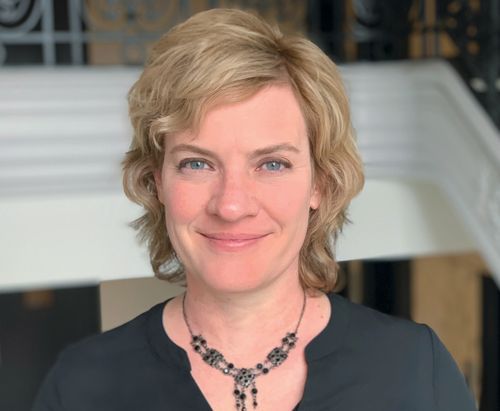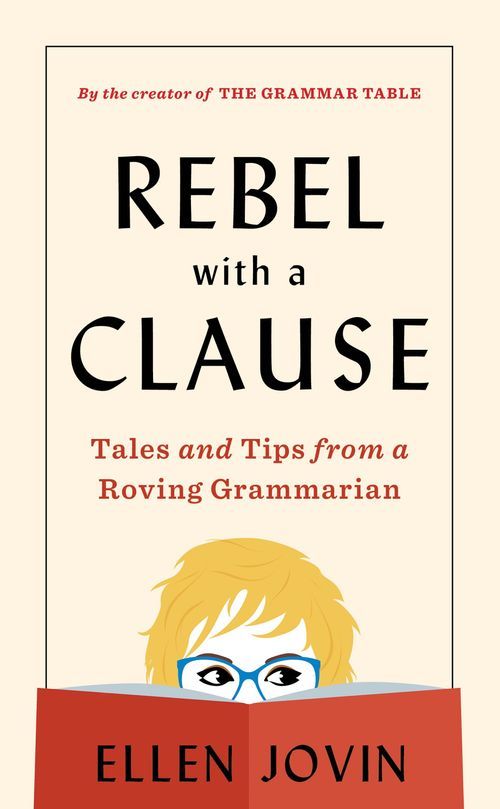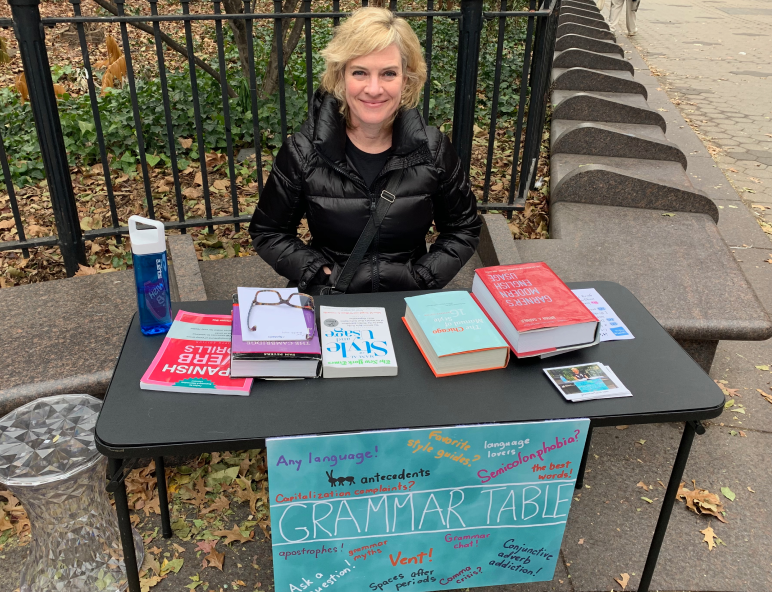 Ellen Jovin has a B.A. from Harvard College and an M.A. from UCLA and has studied twenty-five languages for fun. Jovin is a cofounder of Syntaxis, a communication consultancy, and the author of four books on English and writing,
Ellen Jovin has a B.A. from Harvard College and an M.A. from UCLA and has studied twenty-five languages for fun. Jovin is a cofounder of Syntaxis, a communication consultancy, and the author of four books on English and writing,
She is the creator—and staff—of a traveling pop-up grammar advice stand called the Grammar Table, and her adventures as a traveling grammarian are recounted in her book Rebel with a Clause: Tales and Tips from a Roving Grammarian (HarperCollins, July 2022).
Ellen Jovin and her Grammar Table have traveled nearly 30,000 miles around the U.S. to address the most pressing—and amusing—grammar questions of our time. When not on the road and at the table, she lives with her husband, Brandt Johnson, on the Upper West Side of Manhattan.
Ed Battistella: I really enjoyed Rebel with a Clause. How did you get the idea to become a roving street grammarian?
Ellen Jovin: At first I was a street grammarian without much roving. My first stops involved roving from my apartment building to less than one block from my apartment building and plopping down a table with a sign. I’m not entirely sure why the Grammar Table occurred to me; one day it just did. I do know I was sick of spending so much time online in language chat groups, and I wanted more real-world contact. The computer lifestyle makes me cranky—I am a people person—so it seemed like a natural step to move backwards technologically off the internet to a no-tech, face-to-face medium. And by the way, I load the table up with actual physical reference books, with pages people can touch. I try to keep this grammar life very physical when I’m out there.
EB: You travelled far and wide. Did you have a grammarmobile?
EJ: I haven’t had a grammarmobile, but I’ve definitely had grammarmobile fantasies. My husband and I don’t even own a car here in Manhattan, so we had to rent a car for each Grammar Table road trip. For fun I’ve spent a little recreational time looking at trailers as well as cars with big trunks that could fit a Grammar Table plus luggage, and I’ve actually pondered what could go on the outside of the vehicle, but then I wondered—would a grammarmobile be a special target for anti-grammar graffiti? It might be! Therefore, if I ever did have a grammarmobile, it would probably need to be a special unmarked grammarmobile.
EB: So what are the best spots to talk grammar?
EJ: I follow the feet. I am dependent on foot traffic for my grammar customers. Without people, there are no questions. It’s easier to get visitors in dense urban areas with lots of foot traffic. After New York City, I found Detroit to be one of the pedestrian-friendlier stops we made. But smaller, more remote places are a lot of fun. Red Cloud, Nebraska, has only about 1,000 people in it, but I had tons of conversation with local residents there. In Austin, Texas, I set up along a dirt park path with tree parts hanging down into my hair. Traffic was sparser there in the trees and dirt, but where there is a path, there are people, and where there are people, there are grammar questions.
EB: I was really impressed with how much the people you talked with—from all walks of life—seemed to know about grammar and relieved to find that people are not as judgmental as I feared. Do you think grammar is divisive or does it have the potential to bring us together?
 EJ: The field of linguistics has had an effect on popular attitudes toward grammar. More people understand that a language is neither monolithic nor immutable. You have less of the “This is how it has to be” attitude,” and often people I encounter have heard of prescriptivism and descriptivism. Those weren’t terms I knew when I was in school. Also, the underlying philosophy of the Grammar Table matters. If I approached the subject as a grammar snob, people would feel intimidated, or angered, or put off. And if your discussion of, say, colons is as much fun as a colonoscopy, it will not get a great response either. To me, participles are like a party, and language variety, while maybe not the spice of life, is a spice of life. We play with language at the Grammar Table. It’s a grammar party! And parties are unifying.
EJ: The field of linguistics has had an effect on popular attitudes toward grammar. More people understand that a language is neither monolithic nor immutable. You have less of the “This is how it has to be” attitude,” and often people I encounter have heard of prescriptivism and descriptivism. Those weren’t terms I knew when I was in school. Also, the underlying philosophy of the Grammar Table matters. If I approached the subject as a grammar snob, people would feel intimidated, or angered, or put off. And if your discussion of, say, colons is as much fun as a colonoscopy, it will not get a great response either. To me, participles are like a party, and language variety, while maybe not the spice of life, is a spice of life. We play with language at the Grammar Table. It’s a grammar party! And parties are unifying.
EB: What was the hardest grammar question you got along the way?
EJ: The hardest questions are always the ones that aren’t about grammar. For example: Where is the nearest public bathroom? Usually I have no idea. Or this: What is the centuries-long history of a particular word? A word-history question can be a whole research project.
In the realm of grammar, though, one of the hardest topics to explain, in my experience, is the difference between restrictive and nonrestrictive appositives. Hearing that terminology already puts people off, so never mind—let me just give you an example:
1. The witness Sarah Still was convincing.
2. The witness, Sarah Still, was convincing.
In one sentence there are multiple witnesses, and Sarah Still is one of them. In the other sentence, there is just one witness, and her name is Sarah Still. Which is which? Can we put the answer at the end of this interview and give people a chance to think about it while we continue with other things?
EB: Sure! How did the experience change you? What did you discover or learn along the way?
EJ: I already knew people were full of surprises, but they are even fuller of surprises than I expected. The Grammar Table has reminded me to assume nothing. That unsmiling couple in biker gear standing far away from me may actually be concocting a question about gerunds. The homeless person carrying a sleeping bag may want to discuss dictionaries. The unkempt person with holes in his sweatpants may be a scholar of English literature. I got excellent questions and comments from all walks of life—from lawyers and editors to people who didn’t finish high school, people who work with their hands, high school students all dressed up for a homecoming dance, and so on. Handled with tact and openness, grammar chat isn’t sad and it isn’t inflammatory—it is happy and fun—and when you open a door to people, they will often walk in.
EB: You’ve studied a lot of languages—twenty-five, I read. Do you have a favorite, grammar-wise?
EJ: I hate to be predictable, because I feel this is going to sound trite, but I absolutely loved studying Italian. I love all the different ways you can say the word “the,” I love that lower-case “i” is an actual word, I love Italian past participles, I love the rolling r’s, I love the plural formation patterns for nouns, and so on. There is nothing quite like learning a new writing system, though, and acquiring skills in reading and writing words in Arabic—which lack vowel data and are written right to left and have sounds we don’t have in English—was, and still is, a magical language trip beyond what I could ever have expected. Language-learning keeps you young, by the way. Maybe it’s not scientifically proven, but I think it’s excellent brain lubrication.
EB: Can you tell us about your husband/videographer Brandt Johnson and the Rebel with a Clause documentary?
EJ: I met Brandt in 1994 at a party I didn’t want to go to, thrown by a mutual friend who had tried to set us up six months earlier but who had failed, because neither of us wanted to go on a blind date. We have been together ever since that party and have a communication skills training firm together called Syntaxis. Brandt is a hunky language nerd. He played professional basketball in Europe but then will bring up some totally random language point at three in the morning, which is hot. During our travels, he accumulated 366 hours of Grammar Table footage, including lots of B-roll. He stuck GoPros to our windshield wherever we went! He’s at about ninety minutes now of a movie draft—I don’t know that you are allowed to say “draft” for movies, but I like it—and is hard at work editing the material.
EB: What’s next? I love the idea of a Grammar Table musical. Just sayin’.

EJ: I’m so happy to hear that! Definitely the movie comes first, but I do really love the idea of a grammar musical. One of my favorite musicals ever was The 25th Annual Putnam County Spelling Bee. I was in heaven for every minute of that show. If I could have a Grammar Table musical and a grammarmobile, I would be out of my mind with joy. In the meantime, I do respond to grammergencies at my Twitter account at @grammartable, so people can tag me or message me there.
EB: Thanks for talking with us. I’m recommending Rebel with a Clause to all my friends!
EJ: Well, I am recommending this interview to all my friends! I loved your questions. And thank you for reading my book.
Answer to the grammar question above:
1. The witness Sarah Still was convincing.
This sentence indicates that there are multiple witnesses; Sarah is just one of them. No commas.
2. The witness, Sarah Still, was convincing.
In this sentence, there is only one witness: Sarah Still. More on this topic in Rebel with a Clause!

 Follow
Follow